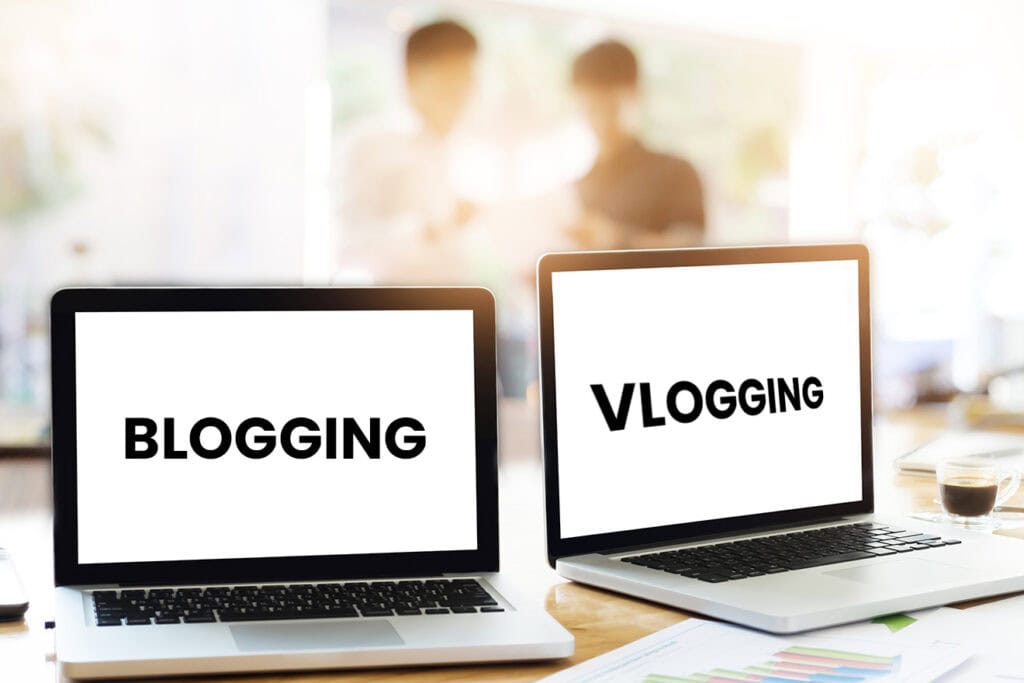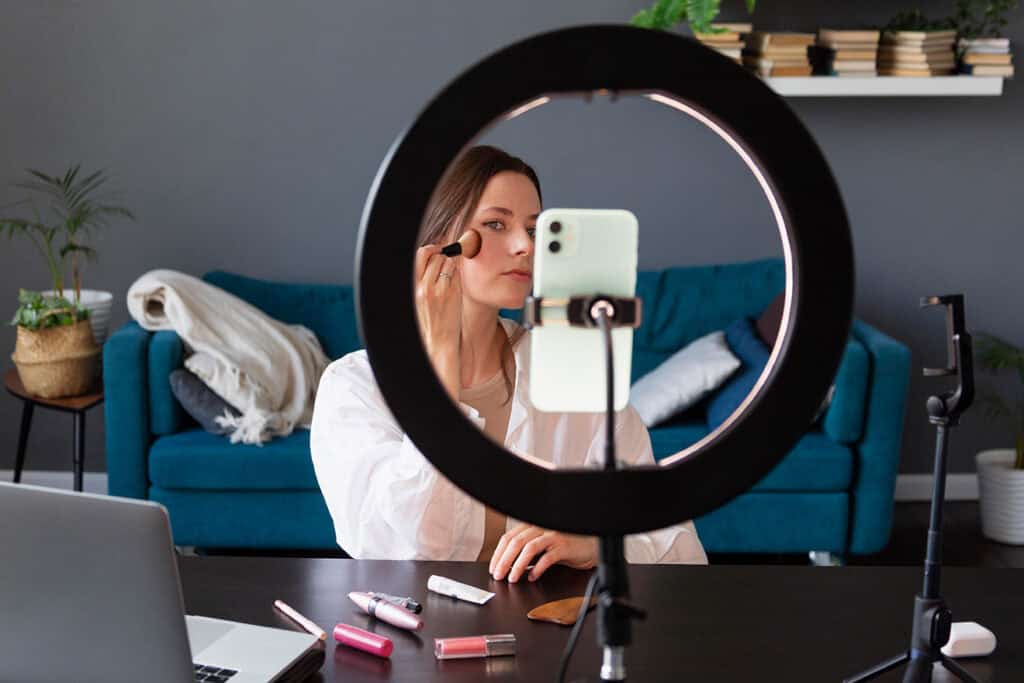
FREE Download For You
Download Your
Blog Optimization Checklist
Hey there, content creator! I want to tell you something that might surprise you: blogging and vlogging are two very different beasts. I know, I know – they both involve creating content and sharing it with the world. But trust me, the differences run deeper than just the medium.
As someone who’s dabbled in both blogging and vlogging, I can tell you firsthand that each format has its own unique challenges and rewards. Whether you’re a seasoned pro or just starting out, understanding the key differences between blogging and vlogging can help you choose the right path for your brand.
So, ready to dive in and explore the world of content creation? Let’s go!
Table of Contents:
- What Is Blogging?
- What Is Vlogging?
- Key Differences Between Blogging and Vlogging
- Which Is Better for Your Brand: Blogging or Vlogging?
- Tips for Creating Engaging Blog and Vlog Content
- Monetizing Your Blog or Vlog
- Successful Examples of Bloggers and Vloggers
- Conclusion
What Is Blogging?
Blogging is all about sharing your thoughts, experiences, and expertise through the written word. It’s a way to connect with like-minded people and build a community around your passions.
Definition of Blogging
At its core, a blog is a website that publishes articles, stories, or essays – also known as “blog posts”. These blog posts are usually displayed in reverse chronological order, with the newest content appearing first.
Blogging has been around since the early days of the internet, but it’s evolved a lot over the years. What started as online diaries has now become a powerful tool for businesses, influencers, and everyday people to share their message with the world.
Types of Blog Posts
The beauty of blogging is that there are no rules when it comes to the type of content you can create. Some popular types of blog posts include:
- How-to guides and tutorials
- Personal stories and anecdotes
- Industry news and updates
- Product reviews and comparisons
- Interviews with experts or influencers
The key is to create content that resonates with your target audience and provides value in some way, whether that’s through education, entertainment, or inspiration.
Benefits of Blogging
So why should you start a blog? Here are just a few of the benefits:
- Establish yourself as an expert in your industry
- Drive traffic to your website
- Generate leads and sales for your business
- Connect with your audience on a deeper level
- Improve your writing skills
I’ve been blogging for over a decade now, and I can honestly say it’s one of the best decisions I’ve ever made. Not only has it allowed me to share my passions with the world, but it’s also opened up countless opportunities for my business and personal brand.
What Is Vlogging?

If blogging is all about the written word, vlogging is its video-based counterpart. Vlogging, or video blogging, involves creating and sharing video content online.
Definition of Vlogging
A vlog is essentially a blog in video format. Instead of writing articles, you record yourself talking to the camera about various topics. These videos are then uploaded to platforms like YouTube, TikTok, or your own website.
Vlogging has exploded in popularity over the past few years, thanks in large part to the rise of social media and smartphones. It’s now easier than ever to create and share high-quality video content with the world.
Types of Vlogs
Just like with blogging, there are endless possibilities when it comes to the types of vlogs you can create. Some popular formats include:
- Daily or weekly vlogs documenting your life
- Tutorial or how-to videos
- Product reviews and unboxings
- Travel vlogs and adventure videos
- Comedy sketches and skits
The key is to find a niche that aligns with your interests and expertise, and then consistently create engaging video content for your audience.
Benefits of Vlogging
So why should you consider starting a vlog? Here are a few compelling reasons:
- Build a personal connection with your audience
- Showcase your personality and unique style
- Tap into the massive audience on platforms like YouTube
- Monetize your content through ads, sponsorships, and more
- Improve your video production and editing skills
I started my YouTube channel a few years ago, and it’s been an incredible journey. Not only have I been able to connect with viewers from all over the world, but I’ve also had the opportunity to work with some amazing brands and fellow creators.
Key Differences Between Blogging and Vlogging

Now that we’ve covered the basics of blogging and vlogging, let’s dive into some of the key differences between the two.
The most obvious difference is the format of the content itself. Blogging is text-based, while vlogging is video-based. This means that the skills and equipment required for each are quite different.
With blogging, all you really need is a computer and a way with words. You can write your posts in a word processor, then upload them to your website or blog platform.
Vlogging, on the other hand, requires a bit more technical know-how. You’ll need a camera (even a smartphone can work), a microphone, and some basic video editing software. You’ll also need to be comfortable speaking on camera and engaging with your audience in a more direct way.
Time Investment
Another key difference is the time investment required for each. While both blogging and vlogging require consistency and dedication, vlogging can be more time-consuming overall.
Think about it – with blogging, you can write a post in a few hours, then schedule it to publish at a later date. You can batch your content creation and work ahead if needed.
With vlogging, you have to actually record the video, which can take several takes to get right. Then you have to edit the footage, add any graphics or music, and upload it to your chosen platform. It’s a more involved process from start to finish.
Equipment and Skills
As I mentioned earlier, the equipment and skills needed for blogging and vlogging are quite different. Here’s a quick breakdown:
| Blogging Equipment | Vlogging Equipment |
|---|---|
| Computer or laptop | Camera or smartphone |
| Word processor (like Google Docs or Microsoft Word) | Microphone |
| Internet connection | Lighting equipment |
| Blogging platform (like WordPress or Squarespace) | Video editing software |
In terms of skills, blogging requires strong writing and editing abilities, as well as a knack for storytelling and engaging your audience through text. Vlogging requires confidence on camera, as well as basic video production and editing skills.
Both blogging and vlogging offer opportunities for audience engagement, but in different ways. With blogging, your readers can leave comments on your posts and engage in discussions with you and other readers. You can also build an email list and connect with your audience through newsletters and other forms of written communication.
With vlogging, engagement often happens in real-time through live streams and premieres. Viewers can chat with you and each other during the video, and leave comments and likes after the fact. You can also engage with your audience on social media and build a community around your channel.
Monetization Opportunities
Finally, let’s talk about the money-making potential of blogging and vlogging. Both can be lucrative, but the monetization strategies differ slightly.
With blogging, common monetization methods include:
- Display advertising (like Google AdSense)
- Affiliate marketing
- Sponsored content
- Digital products (like ebooks or courses)
- Coaching or consulting services
With vlogging, you can earn money through:
- YouTube ads
- Sponsorships and brand deals
- Affiliate marketing
- Merchandise sales
- Fan funding (like Patreon or Super Chat)
The key with both is to build a loyal audience and provide value consistently over time. As your traffic and engagement grows, so too will your earning potential.
Which Is Better for Your Brand: Blogging or Vlogging?

So, which is better for your brand – blogging or vlogging? The answer, as with most things in life, is “it depends.”
First and foremost, consider your own strengths and preferences. Do you feel more comfortable expressing yourself through writing or speaking? Do you enjoy the process of crafting blog posts, or do you thrive on the energy of creating videos?
There’s no right or wrong answer here – it’s all about what feels authentic and sustainable for you. If you force yourself to do something that doesn’t align with your natural skills and interests, it will show in your content.
Considering Your Target Audience
Next, think about your target audience. What type of content do they prefer to consume? Where do they spend their time online?
If your ideal readers are avid blog readers, then blogging may be the way to go. But if your audience skews younger and spends hours watching YouTube videos, vlogging could be a better fit.
You can also look at what your competitors and industry leaders are doing. If everyone in your niche is blogging, there may be an opportunity to stand out with video content. Or vice versa – if your industry is saturated with vlogs, a well-written blog could be a breath of fresh air.
Evaluating Your Resources
Finally, consider the resources you have available to you. Do you have the budget to invest in video equipment and editing software? Do you have the time to dedicate to filming and producing vlogs on a regular basis?
If you’re just starting out, blogging may be a more accessible option. All you really need is a computer and an internet connection. As you grow and build your audience, you can always add video content to the mix later on.
At the end of the day, the most important thing is to choose a format that you enjoy and can commit to for the long haul. Consistency is key when it comes to building a successful brand, whether you’re blogging, vlogging, or a little bit of both.
Tips for Creating Engaging Blog and Vlog Content
I’ve been creating content online since 2013. I currently run three blogs, plus my YouTube channel. My philosophy is that blogs and vlogs should work hand-in-hand to build your brand universe and monetization strategy. Keep reading to discover how.
Developing a Content Strategy
The key to creating engaging blog and vlog content is having a solid content strategy.
Start by identifying your target audience and understanding what type of content they crave. What questions do they have? What problems can you help them solve?
Once you know your audience, brainstorm content ideas that will resonate with them. Plan out a mix of informative, entertaining, and inspiring content.
To get your content in front of as many eyes as possible, it’s crucial to optimize for search engines.
For blog posts, this means incorporating relevant keywords naturally throughout your content, crafting compelling meta descriptions, and using header tags to structure your posts.
When it comes to vlogs, video SEO is key. Use descriptive titles and tags, create eye-catching thumbnails, and include transcripts or closed captions to make your videos more accessible and indexable.
Promoting Your Content
Creating amazing content is only half the battle. To truly succeed, you need to actively promote your blog and vlog.
Share your posts on social media, engage with your audience in the comments section, and collaborate with other creators in your niche.
You can also leverage email marketing to keep your subscribers updated on your latest content and build a loyal following.
Monetizing Your Blog or Vlog
Let’s be real – while creating content is a passion, it’s also nice to earn some money from your hard work. Here are some ways to monetize your blog or vlog:
Affiliate marketing involves promoting other people’s products or services and earning a commission on any sales made through your unique affiliate link.
Find products that align with your niche and provide genuine value to your audience. Share your honest reviews and experiences, and disclose your affiliate relationships to maintain trust.
Sponsored Content
As your blog or vlog grows, brands may approach you to create sponsored content. This could be a dedicated blog post, video, or social media post promoting their product or service.
Be selective with the sponsorships you accept, ensuring they fit your brand and provide value to your audience. Always disclose sponsored content to maintain transparency.
Creating and selling your own digital products is a fantastic way to monetize your blog or vlog. This could include ebooks, courses, templates, or printables related to your niche.
Identify the unique knowledge and skills you have to offer, and package them into a product that solves a problem or meets a need for your audience.
Advertising Revenue
Once your blog or vlog reaches a certain level of traffic, you can start earning money through advertising.
For bloggers, this often means joining an ad network like Google AdSense and displaying ads on your site. Vloggers can enable ads on their YouTube videos and earn a portion of the ad revenue.
Keep in mind that ad revenue can be unpredictable, so it’s best to diversify your income streams.
Successful Examples of Bloggers and Vloggers
Need some inspiration? Check out these successful bloggers and vloggers who have turned their passion into a thriving business:
- Michelle Schroeder-Gardner – This personal finance blogger earns over $100,000 per month through affiliate marketing, sponsored posts, and digital products.
- NikkieTutorials – With over 13 million subscribers, this beauty vlogger has built a massive following with her makeup tutorials and engaging personality.
- PewDiePie – As one of the most successful YouTubers of all time, this video game vlogger has amassed over 100 million subscribers and earns millions through ad revenue and sponsorships.
Remember, success doesn’t happen overnight. These bloggers and vloggers have put in years of hard work, consistently creating valuable content and building a strong relationship with their audience.
So whether you choose blogging or vlogging (or both.), stay focused on providing value, engaging with your audience, and never giving up on your dreams. With dedication and persistence, you too can achieve success in the world of content creation.
Conclusion
Blogging and vlogging are two powerful tools in your content creation arsenal. While they share some similarities, the differences between them are significant.
Blogging is all about the written word, allowing you to craft compelling stories and share in-depth information with your audience. Vlogging, on the other hand, is a more visual and personal medium, giving your viewers a chance to connect with you on a deeper level.
Ultimately, the choice between blogging and vlogging comes down to your strengths, your target audience, and your goals. By understanding the key differences between these two formats, you can make an informed decision and create content that truly resonates with your audience.
So, whether you choose to write or hit record, remember: the most important thing is to be authentic, engaging, and true to your brand. Your audience will thank you for it.

FREE Download For You
Download Your
Blog Optimization Checklist




